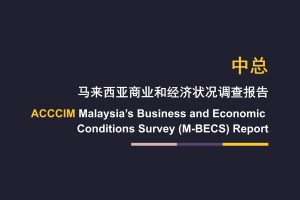Serc
ACCCIM Malaysia's Business and Economic Conditions Survey (M-BECS) Report 1H 2025 and 2H 2025F
The Associated Chinese Chambers of Commerce and Industry of Malaysia’s (ACCCIM) Malaysia’s Business and Economic Conditions Survey (M-BECS) was conducted from 10 July 2025 and 11 August 2025, covering the first half-year of 2025 (Jan-Jun 2025) and expectations for the second half-year of 2025 (Jul-Dec 2025), has received 777 responses.
The survey is a good barometer to gauge Malaysian Chinese business community’s assessment and expectations about domestic business and economic conditions as well as their prospects.
It covers questions to measure expectations about the prospects of economic and business performance; the main factors affecting business performance; and to gauge the implications of current issues and challenges faced by businesses.
Related news:
- (i) 中总商业经济状况报告:企业对大马前景悲观
(ii) SST扩征成本 过半企业计划转嫁消费者
东方日报
- 大马商业与经济状况调查报告 | 中总:多重成本压力 企业对前景悲观
星洲日报
- M-sian business sentiment weakening: ACCCIM survey
The Sun
- ACCCIM Calls For Targeted Tax Measures In Budget 2026 To Boost SME Productivity, Innovation
Bernama
- ACCCIM: Malaysian businesses staying resilient amid cost pressures
New Straits Times





